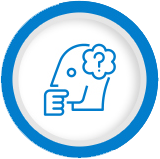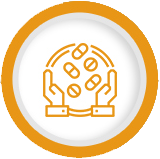Heroin & Mental Health
What Is Heroin?
Heroin is an opioid which originates from morphine, an alkaloid substance derived from a flower known as the opium poppy, which is mainly grown in South America and Asia.
Also known as diamorphine, and other street names such as white china, smack, brown sugar, skunk, white horse and others. Heroin is a substance that is commonly used as a recreational and pain management drug due to its euphoric and analgesic effects. Medically, it is used to relieve pain and also in opioid replacement therapy in many countries.
Heroin can be smoked, snorted, inhaled, or injected into the vein, but the most efficient mode of administration is through injection, as this causes the substance to get to the brain and binds with the opioid receptors rapidly and the effect is felt within minutes of use.
The use of heroin ideally should be under close medical supervision, as it is very addictive and has various side effects. It binds to the receptors in the brain, which causes a release of the dopamine chemical and as with other intoxicating substances. The feeling is temporary, which leaves the individual in constant want of the good feeling, resulting in a continuous intake and subsequently addiction.

- none Easy
- none Confidential
- none Lifetime Support
How Does Heroin Affect the Brain?

The effect of heroin in the brain can be a resounding one, as it is experienced both psychologically and physically. But before getting to know about how heroin works with the brain and the various effects it has, one first has to understand the concept of mental health and mental disorder.
Mental health is attributed to the level of psychological well being and the absence of mental disorder in the body. When heroin is taken, it converts into morphine when it reaches the brain and binds to the opioid receptors in the brain, the brain stem, and the body, to influence the pain perception mechanism of the body, and the result is a temporary good feeling and enhancement in performance.
Morphine disguises as endogenous opioids in the body, which are naturally produced and causes analgesia to relieve pain. This opioid hinders the production of gamma-aminobutyric acid (GABA), a neurotransmitter that depletes the dopamine in the brain. If GABA levels are decreased, dopamine is produced, and euphoria and pleasure are felt by the user.
Dopamine is a neurotransmitter associated with the reward area of the brain and is responsible for enforcing the habits of heroin use and subsequent addiction, which in the long run affects the brain and behavior of the user, and if not treated, drastically depletes the mental health of the individual.
Addiction is a devastating illness which can put all your relationships and your career in chaos. To help you recover and enjoy life again, we strive to heal both you and your relationships. Call us now to begin the road to recovery today!
Get Help Immediatley, Call Now!
Heroin Addiction as a Mental Illness
Heroin addiction qualifies as a mental illness and reasons are that it causes distinct brain changes and can alter a person’s hierarchy of needs and desires, leading them to prioritize drug use, above all other things. A person’s ability to control their urge to use substances, is significantly diminished as these changes occur to the brain, which reinforces the heroin addiction ignoring every available harm that may be caused. Also the compulsive behavior associated with opioid use disorder are similar to other mental illnesses.
An essential characteristic of heroin abuse is an underlying change in brain circuits that persists even after detoxification. Similar to other mental illnesses, addiction may require a long-term treatment approach, opposed to the idea of addiction being a simple issue of will power or an issue that can be resolved by “just saying no”. Instead it should be seen as a chronic brain disorder that requires special medical attention.
The extent of the role of heroin in the commission of crimes is vague and impossible to determine, but it is significant according to data gotten from various sources. Although, victims testify positively to believing that the offender was under the influence of alcohol, in half of the cases associated with heroin. Actual tests carried out showed a much higher percentage of heroin usage in the offender. Crimes associated with heroin usage are the crime of violence, robbery, and rape or sexual assault.
Heroin’s Risks for the Mental Health
Mental health disorder levels in people with heroin addiction, is significantly higher than the overall population of heroin users. It is common for a substance abuser to have concurrent mental health conditions, and among heroin users, post-traumatic stress disorder (PTSD), depression, and suicidal ideation is prevalent. Heroin abuse is dangerous to mental health, and known to quickly disrupt all facets of one’s life, through different ways, if not treated.
Heroin & PSTD
Post-traumatic stress disorder and substance abuse often co-occur. Still not much is known about the connection between heroin and PTSD.
PTSD is a clinical condition caused by the experience of a life-threatening event. The danger faced during this event causes the brain to trigger a flight-or-fight mode, which alters the brain chemicals and causes an elevation in heart rate, blood pressure, body temperature, and respiration, focus and attention levels are at their peak and there is a rush of adrenaline in the body of the individual. This is followed by high alertness and the individual being wide awake, and this can help an individual overcome a potentially dangerous situation, and is a healthy response to danger.

This stress response may continue after the danger is done with, and the need for protection is no longer necessary and this leads to PTSD. The symptoms of PTSD may be experienced in as little as 3 months following the traumatic event (e.g., the death of a loved one, combat, car accident, rape, natural disasters, or childhood trauma), and other life-threatening events.
Heroin abuse and PTSD have a complex relationship, which can affect treatment modalities. High-stress levels can be responsible for a person indulging in heroin use as a means of escape. Heroin can increase the feeling of pleasure, decrease anxiety, and act as a distraction, from painful emotions
Heroin & Depression
Depression and heroin addiction are often deeply related. Heroin is a strong opiate that alters the brain chemistry of the user, resulting in mood changes, psychological dependence, and addiction. Advances in psychiatric treatment, estimate that up to half of the heroin users have experienced depression at a time in their life.
When depression is diagnosed in a person with heroin addiction, (a condition which is known as dual diagnosis), the possibility of long-term recovery is very slim. Also, there is a likelihood of relapse soon after rehab, unless the person is treated for both conditions.
In some cases, the addict may avoid any treatment at all, but fortunately, studies show that when a patient is treated for depression and heroin addiction simultaneously, there is often an improvement in the depressive symptoms. Also according to biological psychiatry, heroin addicts who go through rehabilitation, or methadone maintenance treatment, experience significant improvement in their depression.
The key to achieving success in heroin abuse and depression treatment, is to detect both conditions early in the recovery process, which can be done through intensive neuropsychological assessment, and treatment for both conditions must be immediately started, as soon as both conditions are detected.
Heroin & Suicidal Ideation
Suicide which is the deliberate ending of one’s life through individual actions, is closely linked to heroin and other substance abuse. Hence it is essential to confirm the factors that can result in suicidal behavior.
In a study of close to 5 million veterans, researchers reported that the presence of a diagnosis of opioid use disorder (OUD), led to increased risk of suicide in both men and women, with a record of over 2-fold of suicide risk in men with OUD, and more than 8-fold for women with OUD. Interestingly, when the suicide analysis of other factors was controlled by the researchers, including comorbid and psychiatric diagnosis, greater risk of suicide in females with opioid use disorder was still at its peak.
The possibility of suicidal thoughts can rise upwards of 60% when heroin is abused. Heroin addiction is powerful. The fact that people who used heroin for the first time were using first confirms this claim, and regardless of the daily opioid overdose are attributed to suicide, any number above zero is too many.

Heroin Addiction & HIV
The human immunodeficiency virus (HIV) are species of Lentivirus (a smaller group of retrovirus), responsible for HIV infection and subsequently AIDS (acquired immunodeficiency syndrome), an illness that causes progressive failure of the immune system, creating an avenue for infections and diseases to thrive.
Heroin abuse can lead to blood borne disease such as human immunodeficiency virus (HIV,) if administered intravenously. This is as a result of the risk involved in sharing needles and/or careless needle use habits that makes syringes less sterile. During a study which was conducted on patients with heroin addiction, 61% of them had contacted HIV
Smoking and inhaling of heroin does not reduce the risks of contracting HIV, because people under the influence of this substance are prone to engage in risky sexual behavior, as well as other behaviors that expose them
The HIV virus is very deadly and the estimated average survival time, without treatment is 9 – 11 years, although this can vary based on the HIV subtype. The Virus attacks vital cells in the immune system, such as the helper T cells (which play an essential role in the adaptive immune system), and also the macrophages and dendritic cell, generally creating an environment for opportunistic infections and diseases to thrive.
The presence of HIV in people who abuse heroin endangers them psychologically and further acts to reinforce their addiction. After learning of their HIV infection, a range of negative emotions is experienced by the victim such as anger, guilt, anxiety disorder, hopelessness, shame, confusion and major depressive disorder. The impact of these feeling can be profound, and the intervention of a counsellor or therapist experienced in HIV related psychological conditions is recommended, as they are at higher risk of substance abuse and a stronger hold of the addiction.
On completing treatment we offer lifetime support for your recovery.
Strict client confidentiality policy is in place.
Simply give us a call and we will guide you through the process.
FAQ
How does heroin affect mental health?
Heroin, when snorted, smoked, or taken intravenously quickly gets to the brain and binds to the opioid receptors, to produce a feeling of highness, pleasure, and relief from pain due to its euphoric and analgesic properties. Heroin can quickly become addictive, even after taking it once or twice, and this can be hazardous to the mental health, as it further leads to a potentially endless cycle of addiction, accompanied by other mental and medical illnesses such as depression, post-traumatic disorder (PTSD), anxiety, suicidal ideation HIV and many others.
Can heroin withdrawal worsen my depression?
Just like any other form of addiction, withdrawal from heroin after long-term use, can be followed by rebound effects, which can include depression, especially if the heroin was used as an escape from depression, and the depression experienced, can be felt in greater intensity, as a response to craving in the brain.
Will heroin help with my anxiety?
Heroin is an opioid and can serve as a temporary solution to anxiety, due to its euphoric and analgesic properties, but is not a recommended medical treatment for anxiety, because it can cause an addiction and after some time, the brain stops responding to it, which will bring worse consequences.
Is heroin a good painkiller?
Heroin is a used as a recreational and pain management drug, due to its analgesic elements in many countries, but this process happens under strict medical supervisions, and it is not to be self-medicated
Can I mix heroin with other drugs?
Heroin can be mixed with other drugs and this process is known as cutting. When abused, heroin can cause many health problems, adding other drugs to the mix will significantly worsen the risks.
Heroin is mixed with substances like starch, sugar, talcum powder and some other non-intoxicating substances, by black marketers to gain more.
It can also be mixed with stronger intoxicating substances such as fentanyl, Gamma-hydroxybutyric acid (GHB), Methamphetamines (meth) and 3, 4-methylenedioxymethamphetamine (MDMA or Ecstasy), and some others, to achieve increased high by the user or the vendor, and this is very dangerous.





